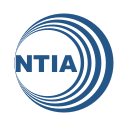Cyberlaw Clinic and Berkman Klein Researchers Submit NTIA Comment on Broadband Research Agenda
Cyberlaw Clinic » Blog 2016-11-08
 Drawing from their experience studying trends in internet services pricing across the country, a team of researchers, including Berkman Klein Center Research Director Rob Faris, Cyberlaw Clinic project coordinator Kira Hessekiel, Berkman Klein fellow David Talbot, and HLS ’18 student Danielle Kehl, submitted a comment to the National Telecommunications and Information Administration and National Science Foundation to advocate for more comprehensive public information on the price of internet access services.
Drawing from their experience studying trends in internet services pricing across the country, a team of researchers, including Berkman Klein Center Research Director Rob Faris, Cyberlaw Clinic project coordinator Kira Hessekiel, Berkman Klein fellow David Talbot, and HLS ’18 student Danielle Kehl, submitted a comment to the National Telecommunications and Information Administration and National Science Foundation to advocate for more comprehensive public information on the price of internet access services.
The two agencies put out a request for comments in early September to advise them in framing a National Broadband Research Agenda to further the recommendations of the Broadband Opportunity Council, a project of 25 federal agencies led by the Department of Commerce, of which NTIA is a division, and the Department of Agriculture.
In their comment, the team discusses the challenges of understanding the state of internet access and adoption without granular, comprehensive data on the cost of residential internet access services. Finding policy solutions to the digital divide necessitates understanding the effect of price, and while information on national aggregate pricing is available, high-level numbers often hide important, geography-specific information from which researchers, policymakers, communities, and individuals could stand to benefit. The Obama Administration has made connecting the unconnected a policy priority in recent years, launching initiatives like ConnectHome and supporting existing federal agency efforts to bridge the digital divide by offering subsidies or discounted internet access service to various segments of the population. Yet these programs are being launched and evaluated without the ability to consider key metrics like speed and price.
Independent researchers, like the Berkman Klein Center commentators, face significant capacity constraints that limit their ability to collect this information on a large scale. Not only does the sheer volume of data make this a daunting task, but key pricing information may be rendered inaccessible by the terms of service of an internet service provider’s website or through a requirement that users enter personal information, such as a social security number or a credit card number. The federal government, particularly the FCC, already collects some data from ISPs, and is far better positioned to collect these data on a large scale and responsibly share them with the public.
The comment recommended that the federal government collect the following data at a granular level from ISPs in a machine-readable format:
- Advertised download and upload speeds;
- Monthly price (including, where applicable, promotional discounts);
- One-time fees (e.g. activation or installation fees, required equipment purchases);
- Recurring fees (e.g. modem or other equipment rentals);
- Contract length and any applicable termination fees; and
- Data caps or other service limits.
By including granular pricing data in the National Broadband Research Agenda, the NTIA and NSF can create a tool that will aid individuals, communities, researchers, and policymakers as they work to close the digital divide for all Americans.